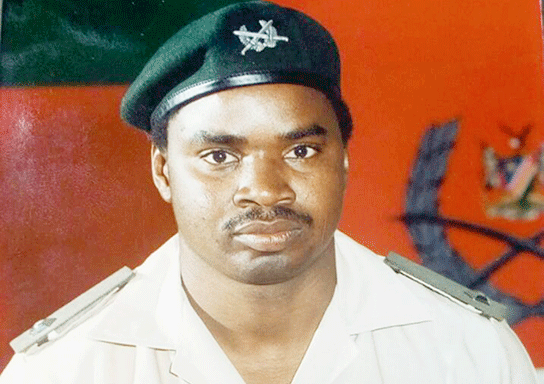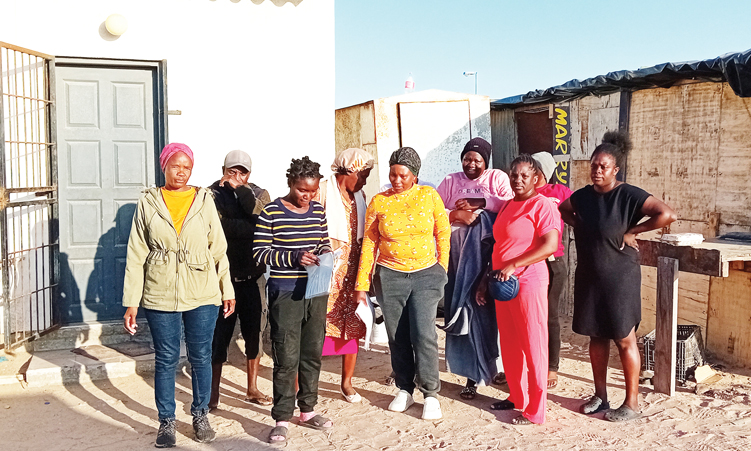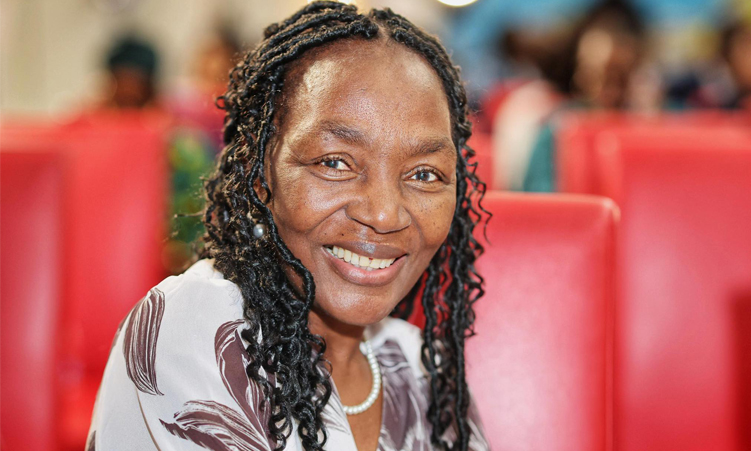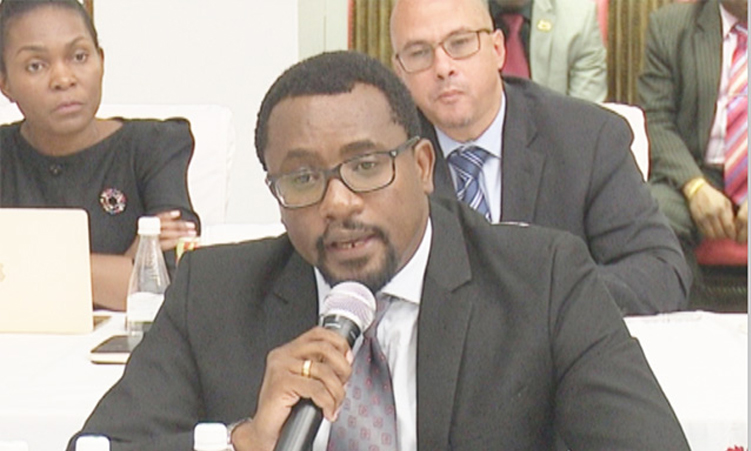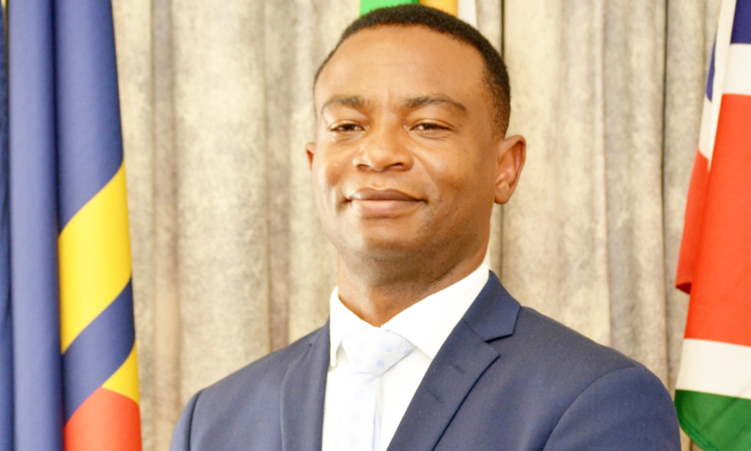. SISA NAMANDJEBY ARMED revolution, Namibia attained its democratic self-governance on 21 March 1990. This came about after a costly and protracted armed liberation struggle.
Our Supreme Court has correctly observed that the cost of victory for our self-governance was measured in human lives, suffering, endurance and endeavour, and that such cost is incalculable.
It is usually forgotten that behind such victory were many unsung heroes who through physical and dangerous endeavours put in a lot of effort to mobilise, command and motivate Plan freedom fighters. One such hero left us on Sunday, 29 October 2017 in Windhoek.
Commissar Peter ‘Mamba’ Shivute died just after his retirement from his position as permanent secretary of the ministry of defence. He died after a relatively long battle with a heart-related condition.
Born on 18 July 1958 at Omuntele in the Oshikoto region, he left Namibia for Angola during or about 1980 to participate in the armed liberation struggle. He did so after his older brother, general Shivute, left much earlier for the same noble cause.
After being trained as a Plan combatant, he quickly rose through the ranks to become a political commissar due to his dedication, unmatched bravery and loyalty to his country and the Swapo Party.
He held this position until April 1990, just after our independence, when commander George Kalomo (now a retired brigadier general), commissar Mamba and another Omuntele-born combatant, the late Martin Kapembe, led more than 600 Plan combatants from Angola to Namibia with weapons, which were later donated by Swapo to the newly-established Namibian Defence Force (NDF). I met commissar Mamba in Lubango (Angola) in 1989. While I, together with other children, were at the Swapo education centre in Lubango, in the same year, two Plan combatants – ‘Chicco’ and Mathias Johannes – organised a visit to the centre by a senior Plan political commissar, who turned out to be Peter “Mamba” Shivute.
While we were singing liberation songs waiting for the arrival of commissar Mamba, we observed a greenish Mahindra pick-up arriving. Out of the pickup came a short, wellbuilt and confident-looking Plan combatant neatly dressed in a North Korean military camouflage uniform and armed with a Soviet-made 9mm pistol.
Commissar Mamba introduced himself to us. Those of us who were from the same area in Namibia as he was, were, of course, happy to find that commissar Mamba was from our area.
Despite us immediately letting him know that we were from the same area as he was, we were somehow disappointed in realising that he paid less attention to that fact.
He emphasised that in Swapo camps (abroad), everybody was simply looked at as a Namibian, irrespective of which area in Namibia he/she was from. Swapo was one family, and groupings by one’s place of origin were discouraged.
After telling us some war stories, he started lecturing us as to why it is important for us to study hard, and as to why after independence, Namibia would need educated citizens. Most importantly, he warned us against tribalism. He discouraged us from being driven, in whatever we do, by the material love of money, and stated that once Namibia was independent, all citizens would benefit from our natural resources, and there would be a huge social transformation driven by Swapo for the benefit of all Namibians.
The next time I heard of commissar Mamba was in April 1990 (after independence) while in Nyango, Swapo health education centre in a western Zambia.
We were informed by our camp director, Tate Kafita, that more than 600 Plan combatants were to leave from Angola to Namibia to take Plan’s weapons of war into the country to be donated to the just-established Namibian Defence Force.
We were told that the group included the legendary political commissar Mamba.
Years later, I came into contact with him when I worked at the ministry of defence almost for two years between 2000 and 2001 where he was first a lieutenant colonel, and later deputy permanent secretary.
He was instrumental in formulating policies to regulate the compensation of the dependants of NDF soldiers who lost their lives in action in the then ongoing military operations in the Democratic Republic of Congo.
Commissar Mamba immensely abhorred corruption, inequality and dishonesty. He always ominously cautioned colleagues and friends to guard against extravagant lifestyles.
He liked emphasising that one would live an uncomplicated and easy life if not under pressure to appear wealthy. He was a man who, whenever he was not happy about something on issues of principles, would immediately and with untrammelled clarity address it.
He contributed, in monumental proportions, to the establishment of the NDF, and the formulation and crafting of many strategic plans of the ministry of defence. His peers, both before and after independence, fondly speak of him as a respected combatant and fearless warrior. He was soft-spoken, but commanded a great deal of respect among his colleagues.
While his heart-related condition inevitably took its toll on his health, he remained resolute and determined to arrive at his office at the ministry of defence every morning until he saw out his public service mandate just a couple of months ago.
During all these years as a military man in the NDF and as a civil servant, he was, with immeasurable love and care, supported by his lovely wife and children.
Their support, I understand, was even more critical during his battle with his heart illness.
When it is ultimately the time to call out all the names of the most distinguished and brave sons of Namibia, Peter Mamba Shivute will be one of them. He was a rare breed of a combatant.
It is, therefore, befitting to state that his departure on 29 October 2017 left a deep sense of loss and despair not only to his family, but also to the whole of Namibia.
Rest in peace, commissar Mamba. You served with distinction both as a Plan combatant, and last as a public servant. We are all proud that you lived a scandal-free life, and held your public position with a high degree of integrity.
Stay informed with The Namibian – your source for credible journalism. Get in-depth reporting and opinions for
only N$85 a month. Invest in journalism, invest in democracy –
Subscribe Now!




